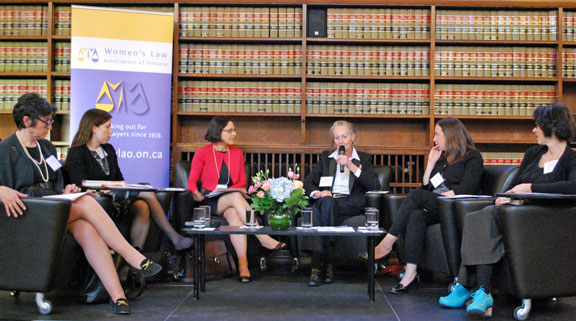“Follow your heart.”
This was one of the main messages from last night’s Diverse Careers for Women in Law panel discussion at the Law Society of Upper Canada.

Hosted by the Women’s Law Association of Ontario, the panellists at this annual event shared their thoughts on issues women face in the legal profession, such as finding your career path, mentorship, and leaving private practice.
Ontario Court Justice Miriam Bloomenfeld told the audience to “remain true to your inner compass.” As a shy student, she said she hated law school but stayed the course and ended up finding her calling as a Crown attorney.
When she was appointed to the bench in December 2005, she said it was difficult to find a place for herself and remain who she was in this new environment, but she persevered and now has great relationships with the other judges, especially other female judges with whom she has built personal connections.
“Don’t do anything because you think it’s something you should do,” said Bloomenfeld.
On the other hand, don’t be afraid to take chances, they advised.
“Just say yes,” said Senator Elaine McCoy. “It’s a great way to move forward in life.”
When McCoy was a young woman, she said she didn’t know what she wanted to be but an older male lawyer suggested she go to law school. So she enrolled and it was one of the best decisions of her life.
Elizabeth Jordan, director at RBC Capital Markets Compliance, encouraged women to get into business, adding that a legal degree provides so many transferable skills that can be applied to other industries.
The women had differing opinions on how to get a mentor, but they all agreed it’s important to have mentors for every stage of your career.
Susan Lightstone, the senior educational consultant at the Ontario Court of Justice, said mentors will help push your career forward but you have to earn the right to be mentored. Don’t complain to your mentor, she advised, instead come to them with focused questions about your career.
Jordan said you should be strategic about the way you ask someone to be your mentor.
The panellists also acknowledged that for many women, it’s difficult to maintain a work-life balance in private practice. Marla Burstyn, vice chairwoman of the Ontario Health Services Appeal and Review Board, said she left private practice after having two children because she wanted more flexibility.
When considering leaving private practice, she said it’s especially important to network.
“The only way to land on something is to know what’s out there, to know your options,” she said.
For women contemplating leaving the legal profession altogether, Lightstone said “Don’t do it!”
After having her second child, she could only get four months of maternity leave and was forced out of the law due to health issues. To make ends meet, she became a freelance legal writer. It’s hard to get back into the legal profession once you leave, she said. So rather than leaving the law, “think about how you can work as a lawyer in a different way,” she told the audience.
“I always thought of myself as a lawyer [and] I am damn glad I never gave it up,” said Lightstone.

 Hosted by the Women’s Law Association of Ontario, the panellists at this annual event shared their thoughts on issues women face in the legal profession, such as finding your career path, mentorship, and leaving private practice.
Hosted by the Women’s Law Association of Ontario, the panellists at this annual event shared their thoughts on issues women face in the legal profession, such as finding your career path, mentorship, and leaving private practice.